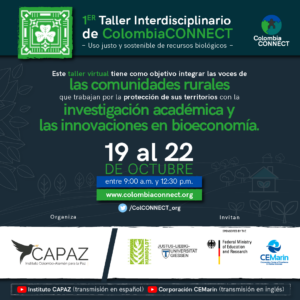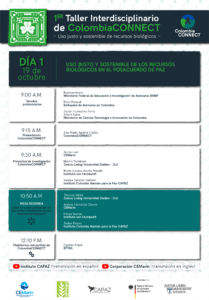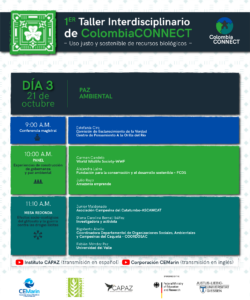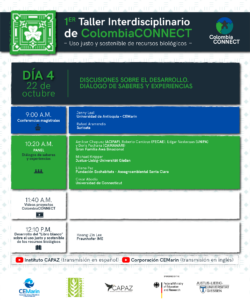
German-Colombian cooperation is committed to environmental peacebuilding
 The “First ColombiaCONNECT Interdisciplinary Workshop – Fair and sustainable use of biological resources in the post-peace agreement period” will be held October 19-22, bringing together more than 35 leading experts, including academics and social leaders, to discuss the most critical aspects of environmental peacebuilding in Colombia. ColombiaCONNECT is a consortium of Colombian-German institutions that obtained funding amounting to 1 million to set up an international network to promote the fair and sustainable use of biological resources in Colombia.
The “First ColombiaCONNECT Interdisciplinary Workshop – Fair and sustainable use of biological resources in the post-peace agreement period” will be held October 19-22, bringing together more than 35 leading experts, including academics and social leaders, to discuss the most critical aspects of environmental peacebuilding in Colombia. ColombiaCONNECT is a consortium of Colombian-German institutions that obtained funding amounting to 1 million to set up an international network to promote the fair and sustainable use of biological resources in Colombia.
The workshop is organised by CAPAZ and intended to integrate the voices of rural communities working for the protection of their territories with academic research and innovations in bioeconomy.
The event will be broadcast on the CAPAZ YouTube channel (in Spanish) and on the Corporación CEMarin channel (in English).
Access to the broadcast in english
The consortium
ColombiaCONNECT is a consortium of Colombian-German institutions that promotes the fair and sustainable use of biological resources by integrating three fields: bioeconomy and sustainable agriculture, biodiversity research and climate change impact, and peace and conflict research.
This is a transdisciplinary network made up of German-Colombian academic and research institutions. The consortium obtained funding under the “CONNECT Education-Research-Innovation” call of the German Ministry of Higher Education and Research (BMBF). These resources are being used to establish an international knowledge and information network that connects biodiversity, bioeconomy, and peace-building studies for the fair and sustainable use of bioresources in Colombia.
In Colombia, the consortium is made up of: CAPAZ, the Corporación Centro de Excelencia en Ciencias Marinas (CEMarin), and the Instituto de Investigación de Recursos Biológicos Alexander von Humboldt.
The topics covered during the event
From 9:00am to 12:30pm (Colombia time) on each day of the workshop, there will be a keynote lecture given by a guest keynote speaker, followed by a panel discussion and a round table discussion.
speaker, followed by a panel discussion and a round table discussion.
The first day will be devoted to the Fair and Sustainable Use of Biological Resources, so we hope to welcome all workshop participants and to present in general terms the partners, projects, and components of the large international research network, ColombiaCONNECT. Peter Ptassek from the German Embassy in Colombia, and Sergio Cristancho from Colombia’s Ministry of Science, Technology, and Innovation, will greet the participants and briefly introduce themselves. Next, the director of ColombiaCONNECT, Ana Maria Aguirre, will present and provide a more in-depth explanation of what the project is about, leading in to the presentation of the research projects that are part of this network. She will be joined by Jenny Leal from CEMarin at Universidad de Antioquia, Martin Tschirner from Justus-Liebig University, Giessen, Rocío Juliana Acuña from the von Humboldt Institute, and Vanesa Giraldo Gartner from CAPAZ.
These presentations will be followed by the question that will open the round table discussion, and that addresses the issue of what is and what could be a fair and sustainable use of biological resources. This round table will include Andrés Osorio from Corporación CEMarin, Felipe García from the von Humboldt Institute, and Stefan Peters from CAPAZ.
 The second day of the workshop will be dedicated to Environmental Justice. After the keynote lecture by Margarita Flórez from Asociación Ambiente y Sociedad, there will be a panel where Diego Cagüeñas, Maria Isabel Galindo, and Sabina Rasmussen from Universidad ICESI; Sterling Londoño from Pastoral Afro de la Diócesis de Quibdó; Ricardo Pereira from Cardiff University; and Britta Sjöstedt and Torsten Krause from Lund University will talk about the Intersections between justice and defense of territories.
The second day of the workshop will be dedicated to Environmental Justice. After the keynote lecture by Margarita Flórez from Asociación Ambiente y Sociedad, there will be a panel where Diego Cagüeñas, Maria Isabel Galindo, and Sabina Rasmussen from Universidad ICESI; Sterling Londoño from Pastoral Afro de la Diócesis de Quibdó; Ricardo Pereira from Cardiff University; and Britta Sjöstedt and Torsten Krause from Lund University will talk about the Intersections between justice and defense of territories.
The day’s round table will discuss the issue of prior consultation and the right of ethnic groups to make decisions about their territories. The panel will include Natalia Orduz from the Heinrich Böll Stiftung, Fernando Herrera from the Akubadaura Community of Jurists, Paulo Bacca from Dejusticia and Amilcar Chapuez from Gran Familia Awá Binacional. The following are the general lines that will be addressed: The definition of the right to free, prior, and informed consultation; achievements and challenges of the right to prior consultation in Colombia; and contributions of the right to prior consultation to the fair and sustainable use of biological resources.
The third day will focus on Environmental Peace, specifically, the relationship between peacebuilding and the environment. The keynote lecture will be given by Estefanía Ciro from the Truth Clarification Commission and the A la Orilla del Río think tank. Following this, the main panel, including Carmen Candelo from The World Wildlife Fund -WWWF, Alejandra Laina from Fundación para la Conservación y el Desarrollo sostenible – FCDS, and Julio Rozo from Amazonía Emprende will focus on the experiences of environmental governance and peacebuilding in different parts of Colombia.
del Río think tank. Following this, the main panel, including Carmen Candelo from The World Wildlife Fund -WWWF, Alejandra Laina from Fundación para la Conservación y el Desarrollo sostenible – FCDS, and Julio Rozo from Amazonía Emprende will focus on the experiences of environmental governance and peacebuilding in different parts of Colombia.
The round table will discuss the socio-ecological effects of glyphosate and the war on illicit drugs. The panel will include Junior Maldonado from Asociación Campesina de Catatumbo-ASCAMCAT, researcher and activist Diana Carolina Bernal, Rigoberto Abello from Coordinadora Departamental de Organizaciones Sociales, Ambientales y Campesinas del Caquetá COORDOSAC, and Fabián Méndez from Universidad del Valle. The general lines that will be addressed are: the social, political, and economic effects of aerial spraying with glyphosate as a strategy for the eradication of illicit crops; the possible effects of glyphosate on human health and the environment; and alternatives to the problem of illicit drugs and territorial peacebuilding.
 Finally, to close, the fourth day will be devoted to the discussing development. In other words, the last day of the workshop offers a diversity of voices from different community, academic, and private sector experiences concerning alternatives to development that respect the autonomy of communities, generate economic processes based on the sustainable use and transformation of biological resources, and recover ancestral conceptions of coexistence with others and nature. Jenny Leal from Universidad de Antioquia and CEMarin researcher, and Rafael Aramendis from Suricata will give keynote lectures.
Finally, to close, the fourth day will be devoted to the discussing development. In other words, the last day of the workshop offers a diversity of voices from different community, academic, and private sector experiences concerning alternatives to development that respect the autonomy of communities, generate economic processes based on the sustainable use and transformation of biological resources, and recover ancestral conceptions of coexistence with others and nature. Jenny Leal from Universidad de Antioquia and CEMarin researcher, and Rafael Aramendis from Suricata will give keynote lectures.
The panel on this fourth day will include Amilcar Chapuez, Roberto Canticus, Edgar Nastacuas and Doris Puchana from Gran Familia Awá Binacional, Michael Knipper from Justus-Liebig University, Giessen, Liliana Paz from Fundación Ecohabitats – Asoagroambiental Santa Clara, and Cesar Abadía from Connecticut University. This day will be devoted to the social appropriation of knowledge, bioeconomy, and Good Living.
Finally, the workshop will culminate with a brief presentation on a book of Best Practices that is expected to be produced by Kwang-Zin Lee of Fraunhofer-Institute for Molecular Biology and Applied Ecology during the next years of working at ColombiaCONNECT.



